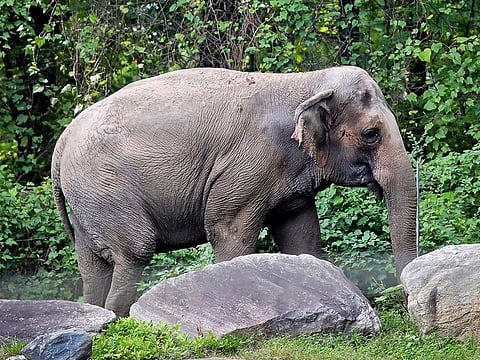Bronx Zoo's Happy the elephant is not a legal person, court rules
The zoo maintained that Happy is not illegally confined

When Happy the elephant arrived at the Bronx Zoo in 1977, the herbivorous mammal was placed inside a fenced area separating her from the zoo's other elephant.
For years, both elephants touched each other's trunks, smelled one another and communicated through the fence, Mary Dixon, a spokeswoman for the zoo, previously told The Washington Post.
But in 2018, the Nonhuman Rights Project, an animal rights organization known for fighting for animals to be recognized as humans, sued the zoo, arguing that Happy should be considered an autonomous person so she qualified for the same protections against imprisonment as humans, adding that - contrary to her name - the elephant was, in fact, not happy in captivity.
After years of back-and-forth legal exchanges, New York's top court ruled Tuesday that although Happy and all elephants are "intelligent beings deserving of proper care and compassion," she is not illegally being held at the Bronx Zoo and cannot be considered a person, the 109-page decision states.
The 5-2 decision written by Court of Appeals Chief Judge Janet DiFiore comes after a lower court also ruled that Happy is not a person, meaning the animal could not be transported to one of the country's two major elephant sanctuaries on the basis of habeas corpus, a legal procedure used to challenge illegal confinement. Advocates argued that Happy would have far more space and interaction with other elephants at a sanctuary.
A spokesperson with the Bronx Zoo did not immediately respond to a message from The Post early Wednesday.
In a statement following the court's ruling, the Nonhuman Rights Project praised Judges Jenny Rivera and Rowan D. Wilson for dissenting with the majority and expressed their disappointment about the ruling.
"This is not just a loss for Happy, whose freedom was at stake in this case and who remains imprisoned in a Bronx Zoo exhibit," the organization said. "It's also a loss for everyone who cares about upholding and strengthening our most cherished values and principles of justice - autonomy, liberty, equality, and fairness - and ensuring our legal system is free of arbitrary reasoning and that no one is denied basic rights simply because of who they are."
It added: "The fact remains that Happy deserves to live freely and with peace and dignity in the vastly larger, more natural environment of a sanctuary designed to respect elephant autonomy."
In the hotly watched case, the Nonhuman Rights Project argued that Happy, who is roughly 50, is an autonomous and cognitively complex animal entitled to protection against unlawful imprisonment under U.S. law.
The zoo maintained that Happy is not illegally confined, saying its staff takes good care of the animal "as the magnificent creature she is." It also argued that Happy - born in the wild and named after a dwarf from the movie "Snow White and the Seven Dwarfs" - is treated with compassion, has contact with the other elephant and has a close bond with its zookeepers.
"At the Bronx Zoo, we are focused on what is best for Happy, not in general terms, but as an individual with a unique and distinct personality," the organization said in a statement.
Asian elephants typically live up to 60 years.
Tuesday's ruling marks another loss for the nonprofit animal rights organization. In 2017, the group lost another legal case in which it argued that two caged chimpanzees were legally people and should be moved to a sanctuary. Last month, it filed a similar lawsuit in central California, urging the release of three elephants at the Fresno Chaffee Zoo.
Sign up for the Daily Briefing
Get the latest news and updates straight to your inbox



